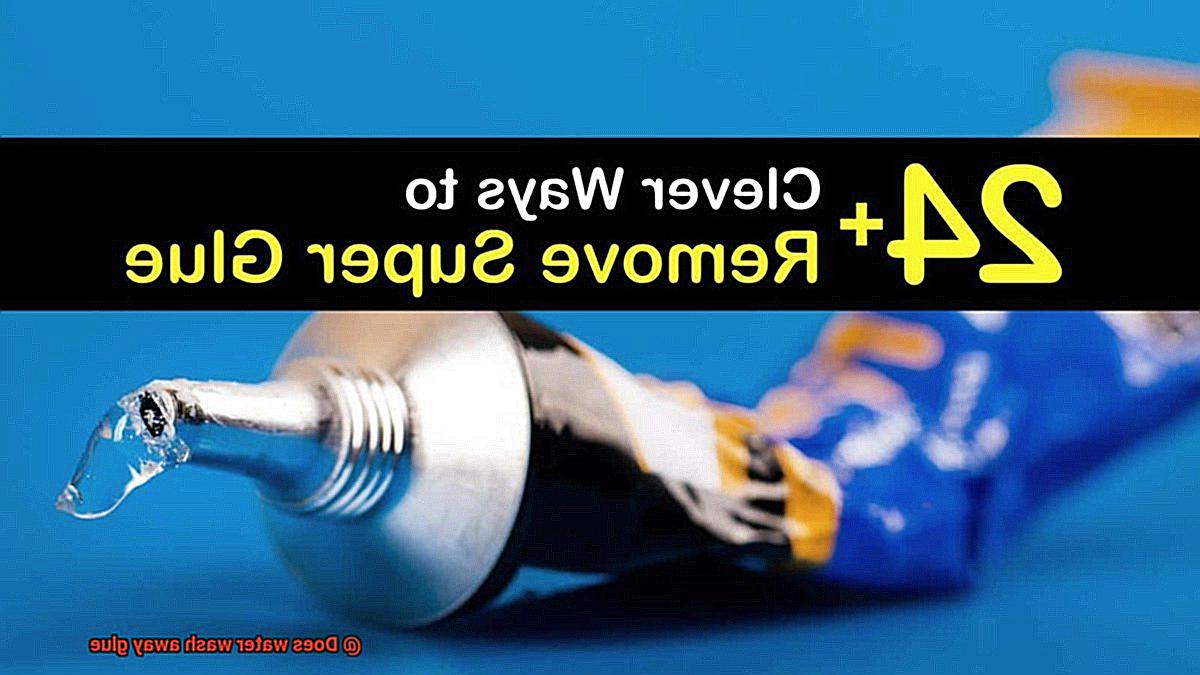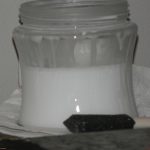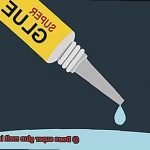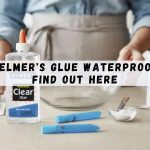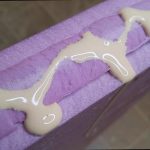Have you ever found yourself in a sticky situation, trying to remove stubborn glue residue from your hands or surfaces? And who hasn’t accidentally spilled glue on their clothes or carpet, creating a frustrating mess that seems impossible to clean? Fear not, my friend, because the solution might be as simple as turning on your faucet.
The age-old question of whether water can wash away glue has left many puzzled. Some swear by it as a quick and easy solution, while others believe that water alone is not enough to completely remove glue. But what does science say about it?
In this blog post, we’ll dive deep into the topic and explore how water works to remove glue. We’ll examine different types of adhesives and their solubility in water. We’ll also discuss whether or not water can weaken the bond between the adhesive and the surface it’s stuck to.
But we won’t stop there. We’ll also explore alternative methods for removing glue when water alone might not cut it. By the end of this article, you’ll have a better understanding of how effective water is for removing glue and what other options are available if you need them.
So, sit back, grab a cup of coffee (or tea), and let’s get started on our quest for clean surfaces.
What Type of Glue Can Be Removed by Water?
Contents
Before we dive into the world of glue removal, let’s first understand what types of glue can be removed by water.
To begin with, let’s get one thing straight – not all glues are created equal. Some are water-soluble, meaning they can be easily dissolved in water and washed away. Others are waterproof or resistant to water and cannot be removed with water alone.
One of the most common types of glue that can be removed with water is white glue, also known as PVA or school glue. Made from polyvinyl acetate, this type of glue is often used for arts and crafts. If you have accidentally spilled white glue on a surface, simply wash it away with warm water and soap.
Gum arabic glue is another type of adhesive that can be easily removed with water. It’s commonly used for bookbinding or art projects and is made from the sap of an acacia tree. Like PVA glue, it’s also water-soluble and can be easily washed away with warm water.
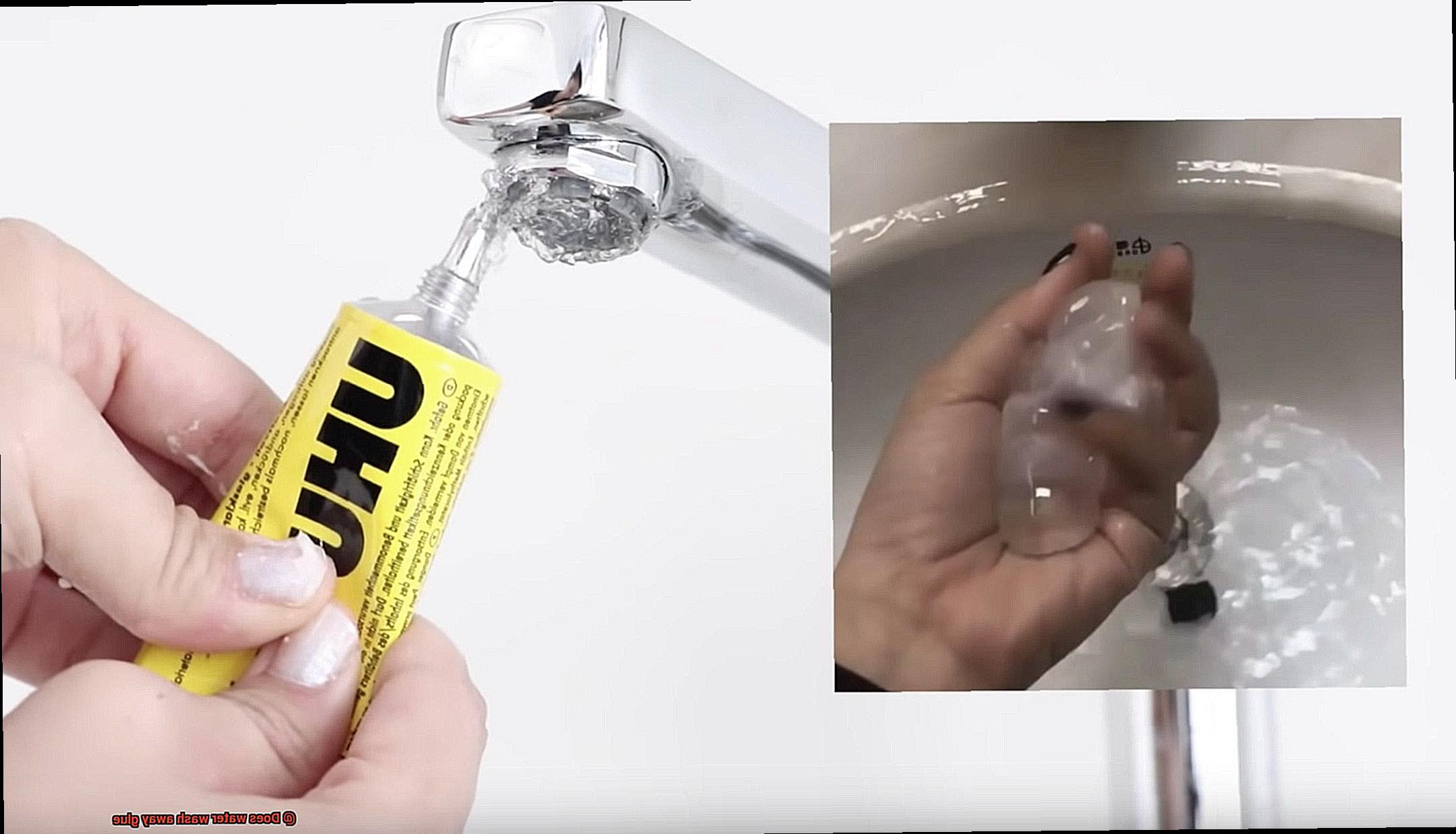
However, some glues cannot be removed with water alone. For instance, superglue or cyanoacrylate adhesive is waterproof and cannot be dissolved with water. Instead, it requires a solvent such as acetone or nail polish remover to break the bond.
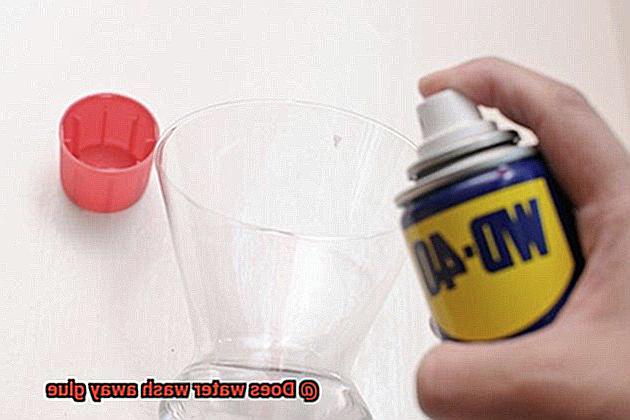
Similarly, epoxy glue is a two-part adhesive that forms a strong and waterproof bond. It also cannot be removed with water alone and typically requires a solvent or scraping to remove it.
It’s also important to consider the surface the glue has been applied on. Porous surfaces like wood or fabric may absorb the glue, making it more difficult to remove with water alone. On the other hand, non-porous surfaces like glass or metal may be easier to clean with water.
Lastly, the duration of time that the glue has been on the surface can also impact its ability to be removed by water. If left for too long, the glue may bond with the surface and become much harder to remove.
The Surface the Glue is Applied On
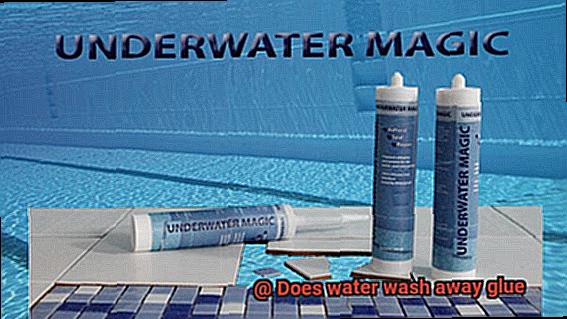
When it comes to water resistance, the surface is absolutely critical. Non-porous surfaces like glass, metal, and plastic tend to repel water, making it harder for water to wash away your glue. However, porous materials like paper, cardboard, and some fabrics absorb water, which can weaken the bond and cause your glue to lose its grip.
If you’re working with a non-porous surface, there are a few things to keep in mind. First, make sure the surface is clean and dry before you apply your glue. Any moisture or residue can hinder the adhesive bond and make it easier for water to wash away your glue. Additionally, some types of glues are specially designed for use on non-porous materials and may provide better bonding strength than others.
On the other hand, if you’re working with a porous surface, the type of glue you choose is critical in determining its resistance to water. Water-based glues like PVA and white glue tend to dissolve in water and may be easily washed away from porous surfaces. However, solvent-based glues like cyanoacrylate (aka super glue) and epoxy are more water-resistant and can provide a stronger bond on porous materials.
Lastly, keep in mind that exposure time to water can also affect the adhesive bond. Short exposure may not significantly weaken the bond, but prolonged exposure can cause the glue to break down and lose its grip.
Duration of Time the Glue Has Been on the Surface
The answer to this question is not always simple and straightforward as it depends on several factors, one of which is the duration of time that the glue has been on the surface.
The age of the glue plays a significant role in determining how easy it is to remove with water. Fresh glue can be washed away with water, while old and hardened glue requires specialized adhesive removers or solvents to break down the glue for easy removal.
In addition, the type of glue used also affects how easy it is to wash away with water. Water-soluble glues such as PVA glue or white school glue dissolve in water and can be easily washed away even if they have been on the surface for a short time. However, some types of glues are designed to be waterproof or water-resistant, meaning that they are not easily washed away with water alone. In these cases, you may need to use abrasive cleaners or specialized solvents to remove them from the surface effectively.
It’s essential to keep in mind that safety precautions should be taken when using any adhesive remover or solvent and read the product label carefully before use.
Advantages and Disadvantages of Using Water to Remove Glue
As an expert in removing glue, I’ve compiled a list of advantages and disadvantages of using water to help you make a well-informed decision.
Firstly, let’s dive into the advantages. Water is a safe and non-toxic substance, making it an ideal option for removing glue from various surfaces without posing any harm to human health or the environment. Additionally, water is readily accessible and requires minimal effort to use, making it a convenient option for removing glue without having to go out and purchase any special products. Using water to remove glue is a simple process that requires little more than wetting the affected area with water and waiting for the glue to soften before wiping it away.
However, there are also some disadvantages to using water for glue removal. Firstly, it can be time-consuming, especially if the glue has been allowed to dry and harden. It may take several attempts of soaking and wiping before all the glue is removed. Moreover, water may not be effective on all types of glue. For example, waterproof or industrial-strength adhesives may require stronger solvents for removal. Lastly, water can cause damage to certain surfaces such as wood or paper if not used carefully. Excessive moisture can cause warping or discoloration, so it’s important to use water sparingly and dry the surface thoroughly after use.
Alternatives to Removing Glue with Water
As an expert in the field, I have compiled a list of alternative methods that are just as effective.
First up, rubbing alcohol. This potent liquid can break down the glue and make it easier to remove. For the best results, use a high percentage of alcohol, such as 90% or higher. Simply apply the alcohol to the affected area and let it sit for a few minutes before attempting to remove the glue.
Secondly, vinegar is another great option thanks to its acidic properties that can dissolve glue. Mix equal parts of vinegar and water and apply it to the glue. Let it sit for a few minutes before attempting to remove the glue.
Next up, oil. Vegetable or coconut oil can help loosen the glue and make it easier to remove. Apply the oil to the affected area and let it work its magic for a few minutes before attempting to remove the glue.
Lastly, using heat is also an effective way to remove glue. A hair dryer on low heat or a heat gun on a low setting can soften the glue and make it easier to remove. But be mindful when using heat, as it can also damage surfaces or cause burns.
g8VMrC_Jqr8″ >
Also Read: How To Remove Adhesive From Painted Walls – Glue Things
Conclusion
After exploring the age-old question of whether water can wash away glue, we have come to a scientific conclusion. It turns out that certain types of glue, such as white glue and gum arabic glue, are no match for H2O. However, waterproof or industrial-strength adhesives require a bit more oomph to remove.
While using water to remove glue has its perks – it’s safe, non-toxic, and easily accessible – it may not always be the most effective solution. The surface the glue is on and how long it has been there also play a significant role in determining its removability with water.
But fear not. If water doesn’t do the trick, there are other options available. Rubbing alcohol, vinegar, oil, or heat can all be used to tackle stubborn adhesives.
In summary, when you find yourself in a sticky situation involving unwanted glue residue on your hands or surfaces, don’t hesitate to turn on the tap.

